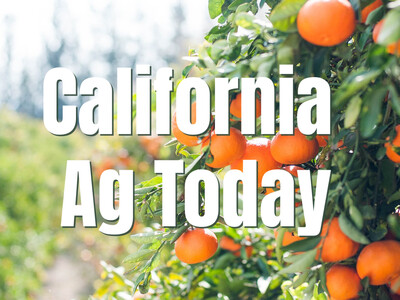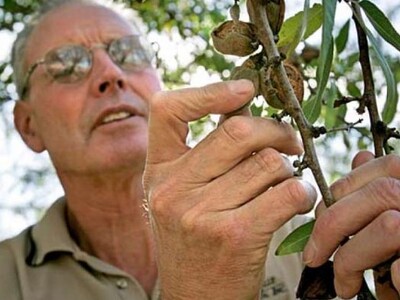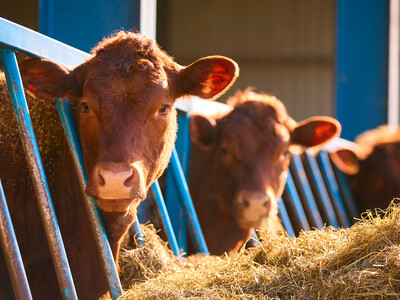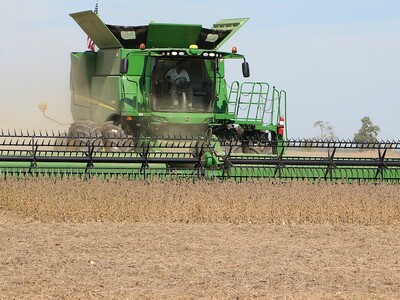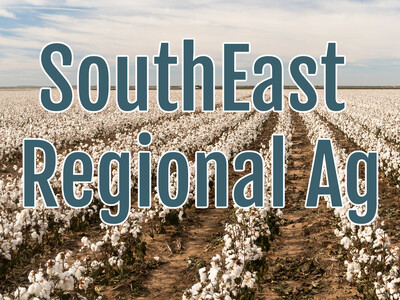U of I Research Dairy
U of I Research Dairy Raising the Bar for InnovationInnovation and efficiency will be the hallmarks of the Idaho Center for Agriculture, Food and the Environment (Idaho CAFE) — a University of Idaho-led facility under construction in the Magic Valley that will include the nation’s largest research dairy.
CAFE, located near Rupert, is scheduled to commence milking operations by early 2026, starting with about 400 cows in the first year and gradually ramping up to about 2,000 cows, to reflect the size of an average Idaho dairy herd.
The project’s first phase, which includes major earth work and construction of a milking barn with a modern rotary parlor, has been completed and the next phase of construction (maternity and commodity barns and classrooms) is underway. In early May, U of I led a tour of lawmakers, local officials and members of the state’s Permanent Building Fund Advisory Council to showcase the return on the considerable investment they’ve made in CAFE.
CAFE has been made possible by a partnership involving U of I, industry and government. In 2017, the Idaho Legislature appropriated $10 million from the state’s Permanent Building Fund to help finance the project. In September 2022, the Idaho Board of Land Commissioners awarded $23.25 million toward CAFE from the sale of U of I endowment land in Caldwell that was no longer being used for experimental farming. During the 2025 session, the Legislature appropriated $250,000 toward building maintenance funds for the new milking parlor.
As part of the tour showcasing CAFE’s innovations, visitors learned about the water reuse system incorporated into the diary. The water used to rapidly chill milk from approximately 101 degrees to 38 degrees is captured and repurposed in an automated, self-flushing system to clean the milking-parlor floor. Afterward, this same water is reused once more to irrigate crops raised within an adjacent soil and water demonstration farm.
With the support of automation, the milking parlor can be efficiently operated by a team of just three employees per shift, who can accommodate the entire CAFE herd in under three hours.
Robots will spray cows’ teats with sanitizer prior to each milking — a task typically done manually by dairy workers. A separate robotic system will sanitize teats again following milking, and milking units will automatically be sanitized and flushed between milking each cow.
The facility will achieve additional labor efficiencies through an automated crowd gate, with a bar that will lower behind cows within the holding pen, slowly moving forward and guiding them through the parlor entrance.
Ear tags will link cows to computerized records detailing individual characteristics, health records, lactation history, age, pregnancy status and other relevant information. Furthermore, specialized collars — essentially bovine pedometers — will track cows’ movements, as well as the number of steps they take. The data will be useful in helping the CAFE staff assess animal health and determine which cows may be in heat, given that cows tend to take far more steps when they are in heat.
A sensor inside the rumen of each cow will alert dairy personnel when animals become sick well before they are symptomatic.
During the winter, a concrete pad by the front entrance will use radiant heating to prevent spilled milk from freezing and posing a safety hazard.
Tour groups will observe dairy operations through a window from atop a catwalk, maintaining a quiet atmosphere for cows.
The facility will provide research into challenges affecting Idaho dairies at an industry scale, making findings more applicable to their operations. The dairy industry collaborated closely with U of I in designing CAFE.
“This is the first time you can do research on this kind of a scale in the U.S. ever, so this is a big deal,” Idaho Senate President Pro Tempore Kelly Anthon, R-Rupert, told the CAFE tour group. “We need to keep on supporting this facility. It’s going to mean a lot for Idaho and the Idaho economy.”
Idaho is the third largest producer of dairy products in the U.S., and Anthon noted the Magic Valley has benefited from $1.9 billion in capital expenditures in food processing facilities, accounting for 900 new jobs, in the past two years alone. Anthon, who is also Rupert’s city administrator, mentions CAFE at the start of any meeting in which he seeks to entice foreign companies to invest in the Magic Valley.
“When we meet with these companies, we’re saying to them, ‘Look, if you are anywhere in this sector, you ought to know that the largest research dairy in the U.S. is located in Rupert, Idaho,’ and you tie that in with the largest yogurt factory in the world in our region,” Anthon said. “You start selling all these things and talking about logistics, and some of these companies will say, ‘You know, we ought to be in Idaho,’ especially if they are dairy related.”
McAlvain Construction of Boise is the general contractor. Keller Associates Inc. completed project engineering.
The classroom space now under construction will include an advanced distance-learning facility, where U of I will host classes for graduate and undergraduate students, Extension courses, workforce development instruction and collaborative classes with community colleges. Professor Mireille Chahine, acting head of the Department of Animal, Veterinary and Food Sciences, envisions using the facility to connect with professors at the Moscow campus, other U of I Research and Extension Centers and even global experts who will be invited as guest speakers. She expects universities worldwide will wish to collaborate on work at CAFE, which could lay the groundwork for Idaho to open new trade markets. Being based at CAFE will also provide students with hands-on learning activities in a real-world setting.
The final phase will add shaded pens, concrete lanes for cows and a manure processing facility for testing and evaluating manure treatment and nutrient separation technologies.
Matt Powell, interim associate dean of research and director of the Idaho Agricultural Experiment Station, recently toured one of Spain’s largest and most innovative dairies. The dairy operators told Powell they implemented many of their innovative concepts following a tour of Idaho’s dairy industry. Powell believes CAFE will keep Idaho at the forefront of dairy innovation and maintain the state’s global reputation for ingenuity.
“That’s exactly the sort of impact we want to maintain, progress and move forward with this facility,” Powell said. “The world is looking to us to lead in that direction.”






